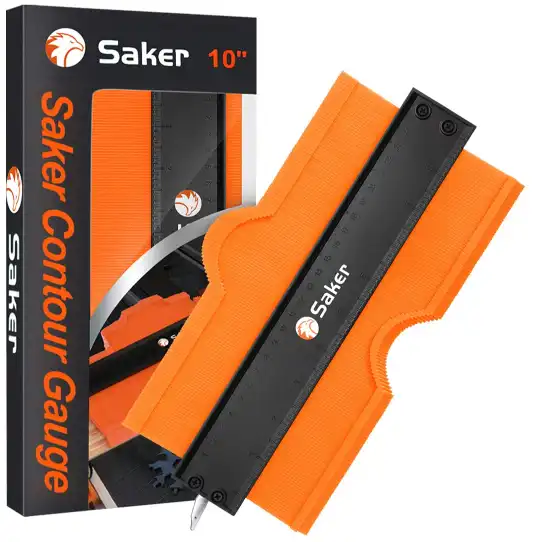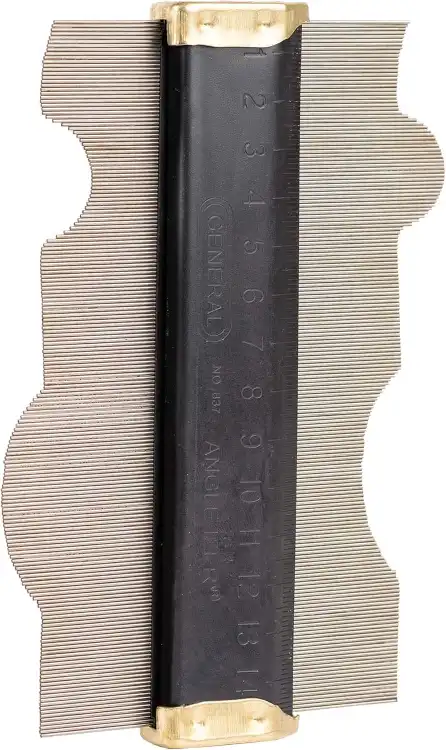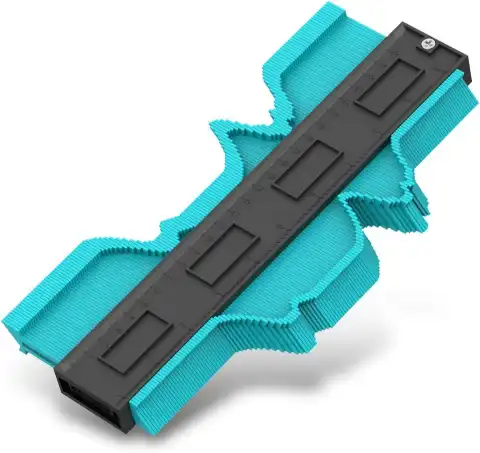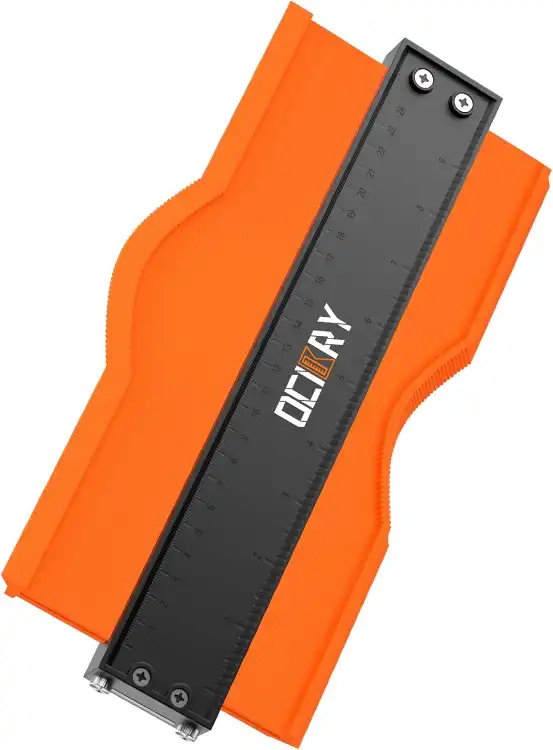Contour gauges are essential tools in the world of carpentry, DIY projects, and even in the automotive industry. These handy devices are designed to help you replicate and transfer complex shapes with precision and ease. They are especially useful when you need to cut a material to fit precisely around an irregularly shaped object.
At first glance, a contour gauge may look like a comb or a brush, but it’s far more than that. It consists of a set of steel or plastic pins that are closely fitted together in a holder. When pressed against an object, these pins move to match the object’s shape, creating an exact profile that can be traced or cut out.
Whether you’re a professional carpenter, a DIY enthusiast, or someone who enjoys crafting, a contour gauge can be a game-changer. It simplifies the process of measuring and cutting, saving you time and reducing waste from inaccurate cuts.
Our Top Contour Gauge Picks

Saker Contour Gauge
Check on AmazonKey Specs:
- Width: 5.9 inches for increased coverage
- Material: High-quality ABS plastic for durability
- Locking Feature: Adjustable tightness for precision
- Measurement System: Dual-scale (inch & cm) for versatility
- Application: Ideal for woodworking, tiling, and automotive work
The Saker Contour Gauge is an essential tool for precision work, whether in woodworking, tile installation, or automotive projects. What sets this gauge apart is its 5.9-inch width, which provides greater surface coverage compared to standard models. The adjustable and locking mechanism ensures a secure fit, eliminating slippage during tracing. Constructed from durable ABS plastic, it’s both lightweight and resistant to rust. The dual-scale measurement system (inches & centimeters) enhances accuracy, making shape replication effortless.

General Tools Contour Gauge
Check on AmazonKey Specs:
- Material: Stainless steel pins for precision and durability
- Leaves Per Inch: 35 for highly detailed profiles
- Measurement Depth: Up to 3 inches for complex shapes
- Markings: Built-in ruler for added functionality
- Application: Ideal for woodworking, molding, and home improvement
The General Tools Contour Gauge is a 6-inch precision tool designed for professionals who demand accuracy in woodworking, molding, and home improvement projects. Unlike plastic alternatives, this gauge features ultra-thin stainless steel pins, ensuring superior durability and precision when capturing intricate profiles. With 35 leaves per inch, it delivers exceptional detail, making it ideal for spindle duplication and molding replication. The built-in ruler markings add convenience, while its 3-inch depth capacity allows for accurate measurements of complex shapes.

Feeke Contour Gauge
Check on AmazonKey Specs:
- Sizes: 10-inch and 5-inch contour duplicators for versatility
- Material: Durable ABS plastic, rust-resistant
- Locking Feature: Ensures precise and consistent shape retention
- Upgraded Pins: Thinner for enhanced accuracy in tracing
- Dual Scales: Inch and centimeter markings for universal measurements
The Feeke Contour Gauge is an indispensable tool for craftsmen, carpenters, and DIY enthusiasts who require precision in shape duplication. With both 10-inch and 5-inch deepen contour gauge duplicators, this tool adapts to various project sizes, from tiling to woodworking. The adjustable locking mechanism ensures that measurements remain consistent, while the upgraded thin pins allow for high-accuracy tracing. The dual-scale design (inch & centimeter) adds convenience, making it a versatile and reusable tool for countless applications.

Tinmarda Contour Gauge
Check on AmazonKey Specs:
- Size: 10-inch length for capturing larger profiles
- Material: Sturdy, high-quality ABS plastic for longevity
- Measurement: Dual-scale (inch & centimeter) for precision
- Ease of Use: Press-and-trace mechanism for quick duplication
- Versatile Applications: Ideal for molding, flooring, tiles, and pipes
The Tinmarda Contour Gauge is a must-have tool for woodworkers, tilers, and DIY professionals who demand precision and efficiency. With its 10-inch length, it effortlessly captures and replicates irregular shapes, from curved moldings to complex tile cuts. Constructed from high-quality ABS plastic, it ensures durability without compromising flexibility. The dual-scale markings (inch & centimeter) provide accurate measurements, while the press-and-trace mechanism simplifies the workflow. Whether for flooring, carpentry, or renovation, this tool guarantees seamless shape duplication every time.

Ocikry Contour Gauge
Check on AmazonKey Specs:
- Size: 10-inch length for capturing large profiles
- Material: ABS plastic with a sturdy aluminum core
- Measurement: Dual-scale (inch & centimeter) for accuracy
- Adjustability: Two accessible screws for effortless tension control
- Locking System: Upgraded metal lock for secure shape retention
The Ocikry Contour Gauge is engineered for precision and durability, making it an essential tool for woodworkers, tilers, and DIY enthusiasts. Unlike standard plastic models, this 10-inch gauge features an aluminum core, ensuring superior strength and rust resistance. The adjustable tension screws allow for quick fine-tuning without the need for hex wrenches, while the metal locking mechanism secures measurements with unmatched stability. With inch and centimeter markings, this tool provides seamless shape duplication for complex cuts in flooring, carpentry, and renovation projects.
Understanding the Purpose and Use of Contour Gauges
Contour gauges serve a simple yet crucial purpose: they capture and replicate irregular shapes so that you can work with precision. They are commonly used in woodworking, tile laying, carpet fitting, and many other applications where precise measurements are required.
Using a contour gauge is straightforward. You press it against the object or surface you want to replicate, and the pins will shift to match the shape. You can then trace this shape onto the material you’re working with, ensuring a perfect fit. This is particularly useful when you’re dealing with intricate designs or irregular shapes that would be difficult to measure using traditional tools.
Contour gauges are not just for professionals. They are also a great tool for DIY projects at home. Whether you’re installing new flooring, creating a custom piece of furniture, or even crafting, a contour gauge can help you achieve professional-level accuracy.
Different Types of Contour Gauges
There are several types of contour gauges available on the market, each designed to suit different needs and applications. The most common types are the pin type, the wire type, and the digital type.
The pin type is the most traditional and widely used. It features a row of closely fitted pins that move to match the shape of the object. The wire type, on the other hand, uses thin wires instead of pins, making it more flexible and suitable for capturing more intricate shapes.
The digital type is a more modern version that provides a digital readout of the measurements. This can be particularly useful for complex projects that require precise measurements. However, it’s worth noting that digital contour gauges are typically more expensive than their traditional counterparts.
Key Features to Look for in a Contour Gauge
When choosing a contour gauge, there are several key features to consider. First and foremost, you should look at the gauge’s accuracy. The more accurate the gauge, the more precise your measurements will be, leading to better results in your work.
Another important feature is the gauge’s size. Depending on the project you’re working on, you might need a larger or smaller gauge. For instance, if you’re working on a large-scale project like installing flooring, a larger gauge would be more suitable. On the other hand, if you’re working on a small craft project, a smaller gauge would be more appropriate.
Finally, consider the gauge’s material. Most contour gauges are made of either plastic or metal. Plastic gauges are lighter and more affordable, but they may not be as durable as metal ones. Metal gauges, on the other hand, are more durable and accurate, but they can be heavier and more expensive.
Material Considerations for Contour Gauges
The material of a contour gauge plays a crucial role in its durability, accuracy, and ease of use. The most common materials used are plastic and metal, each with its own set of advantages and disadvantages.
Plastic contour gauges are lightweight and affordable, making them a popular choice for casual DIYers and hobbyists. They are also resistant to rust, which can be a significant advantage in certain environments. However, plastic gauges may not be as durable or accurate as their metal counterparts.
Metal contour gauges, typically made of stainless steel or aluminum, are known for their durability and precision. They are less likely to wear out over time, ensuring that they maintain their accuracy for longer. However, metal gauges are generally heavier and more expensive than plastic ones.
Size and Dimension Considerations for Contour Gauges
The size and dimensions of a contour gauge are important factors to consider when choosing the right tool for your needs. These factors can significantly impact the gauge’s usability and the types of projects it can be used for.
Contour gauges come in a variety of sizes, typically ranging from 5 inches to 25 inches in length. Smaller gauges are more suitable for intricate work and smaller projects, while larger gauges are better for larger-scale projects like flooring or wall paneling.
The depth of the gauge is another important dimension to consider. A deeper gauge can capture more detailed profiles, making it more suitable for complex projects. However, a deeper gauge can also be more difficult to use and may not be necessary for simpler projects.
The Importance of Accuracy in Contour Gauges
Accuracy is arguably the most important feature of a contour gauge. After all, the primary purpose of these tools is to capture and replicate shapes with precision. An inaccurate gauge can lead to mistakes in your work, wasting time and materials.
Accuracy in a contour gauge is determined by the closeness of the pins or wires. The closer they are, the more detailed the profile they can capture. However, very closely spaced pins can also make the gauge more difficult to use, especially on rough or uneven surfaces.
When choosing a contour gauge, it’s important to balance accuracy with usability. A highly accurate gauge may not be necessary for all projects, and a gauge that is difficult to use can slow down your work. Consider the requirements of your specific project when making your choice.
Understanding the Locking Mechanism in Contour Gauges
A key feature of many contour gauges is the locking mechanism. This feature allows you to lock the pins or wires in place after they have been shaped, preserving the profile for later use.
The locking mechanism is particularly useful when you need to transfer the shape to another location or when you need to make multiple cuts of the same shape. By locking the shape in place, you can ensure that it doesn’t shift or change as you work.
However, not all contour gauges come with a locking mechanism. While this feature can be very useful, it can also add to the cost of the gauge. If you’re on a tight budget or if you don’t anticipate needing to preserve shapes for later use, a gauge without a locking mechanism may be sufficient for your needs.
The Role of Depth in Contour Gauges
The depth of a contour gauge refers to the length of the pins or wires. This is an important factor to consider as it determines how detailed a profile the gauge can capture.
A deeper gauge can capture more detailed profiles, making it more suitable for complex projects. For instance, if you’re replicating a detailed molding or an intricate piece of furniture, a deeper gauge would be more appropriate.
However, a deeper gauge can also be more difficult to use, especially on flat or shallow surfaces. If you’re working on a simpler project or if you’re new to using contour gauges, a shallower gauge may be more suitable.
Ease of Use and User-Friendliness of Contour Gauges
Like any tool, a contour gauge should be easy and comfortable to use. A user-friendly gauge will make your work more efficient and enjoyable, while a difficult-to-use gauge can slow you down and cause frustration.
One factor that affects the ease of use is the gauge’s size. A larger gauge can be more difficult to handle, especially for intricate work. On the other hand, a smaller gauge may not be suitable for larger projects.
The gauge’s material can also affect its user-friendliness. Metal gauges are generally more durable and accurate, but they can be heavier and more difficult to handle than plastic ones. Consider your own comfort and the requirements of your project when choosing a contour gauge.
Durability and Longevity of Contour Gauges
When investing in a contour gauge, you want a tool that will last. The durability and longevity of a contour gauge are largely determined by its material and construction.
Metal gauges, particularly those made of stainless steel or aluminum, are generally more durable than plastic ones. They are less likely to wear out over time, ensuring that they maintain their accuracy for longer. However, they can also be more expensive.
Plastic gauges, while less durable, are resistant to rust and are often more affordable. They can be a good choice for casual DIYers or for those on a tight budget. However, they may need to be replaced more frequently than metal gauges.
Maintenance and Cleaning of Contour Gauges
Proper maintenance and cleaning are essential to keep your contour gauge in good working condition. Regular cleaning can prevent the buildup of dirt and debris, which can affect the gauge’s accuracy and ease of use.
Most contour gauges can be cleaned with a soft brush or cloth. Avoid using harsh chemicals or abrasive materials, as these can damage the gauge. If the gauge is made of metal, it’s also important to keep it dry to prevent rust.
Regular maintenance should also include checking the gauge for any signs of wear or damage. If the pins or wires are bent or loose, they may not accurately capture shapes. In such cases, it may be necessary to replace the gauge.
Safety Precautions When Using Contour Gauges
While contour gauges are generally safe to use, it’s still important to follow certain safety precautions. These precautions can prevent accidents and ensure that you can use the gauge effectively and comfortably.
Firstly, always handle the gauge with care. The pins or wires can be sharp and could cause injury if not handled properly. When using the gauge, make sure your fingers are away from the pins or wires to avoid getting pinched.
Secondly, always use the gauge on a stable surface. Using the gauge on an unstable or uneven surface can result in inaccurate measurements and could also cause the gauge to slip, potentially leading to injury.
Price Range and Value for Money in Contour Gauges
Contour gauges come in a wide range of prices, from affordable plastic gauges to more expensive metal ones. The price of a gauge is typically determined by its material, size, and features.
While it can be tempting to go for the cheapest option, it’s important to consider the value for money. A cheap gauge may not be very durable or accurate, meaning you may end up having to replace it sooner than expected. On the other hand, a more expensive gauge may offer better accuracy and durability, making it a better investment in the long run.
When considering the price, also consider the gauge’s features. Features like a locking mechanism or a digital readout can add to the cost, but they can also make the gauge more useful and efficient. Consider your own needs and budget when choosing a contour gauge.
Conclusion: Making the Right Choice for Your Contour Gauge Needs
Choosing the right contour gauge can make a significant difference in your work, whether you’re a professional carpenter, a DIY enthusiast, or a hobbyist. By considering factors like the gauge’s material, size, accuracy, and features, you can find a gauge that suits your needs and budget.
Remember, the best contour gauge is not necessarily the most expensive one, but the one that best fits your needs. Consider the type of projects you’ll be using the gauge for, your own comfort and ease of use, and the gauge’s durability and longevity.
With the right contour gauge, you can work with precision and ease, saving time and reducing waste. So take your time, do your research, and make the right choice for your contour gauge needs.
